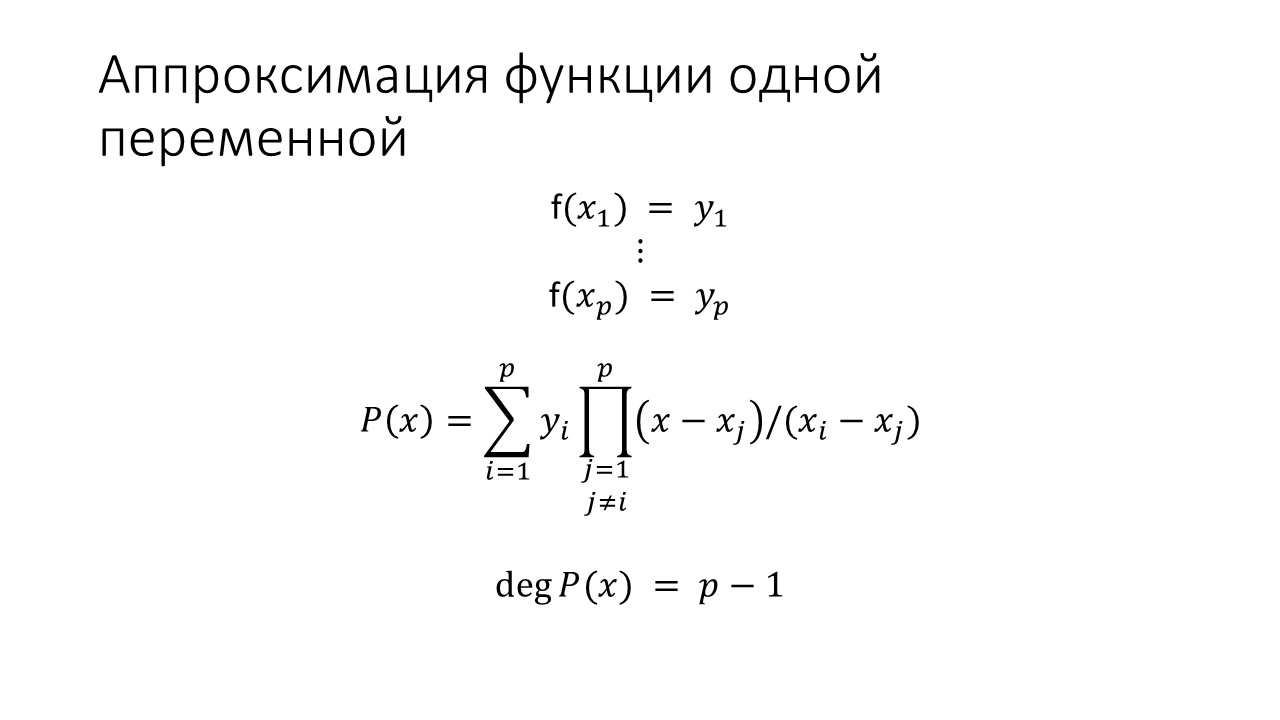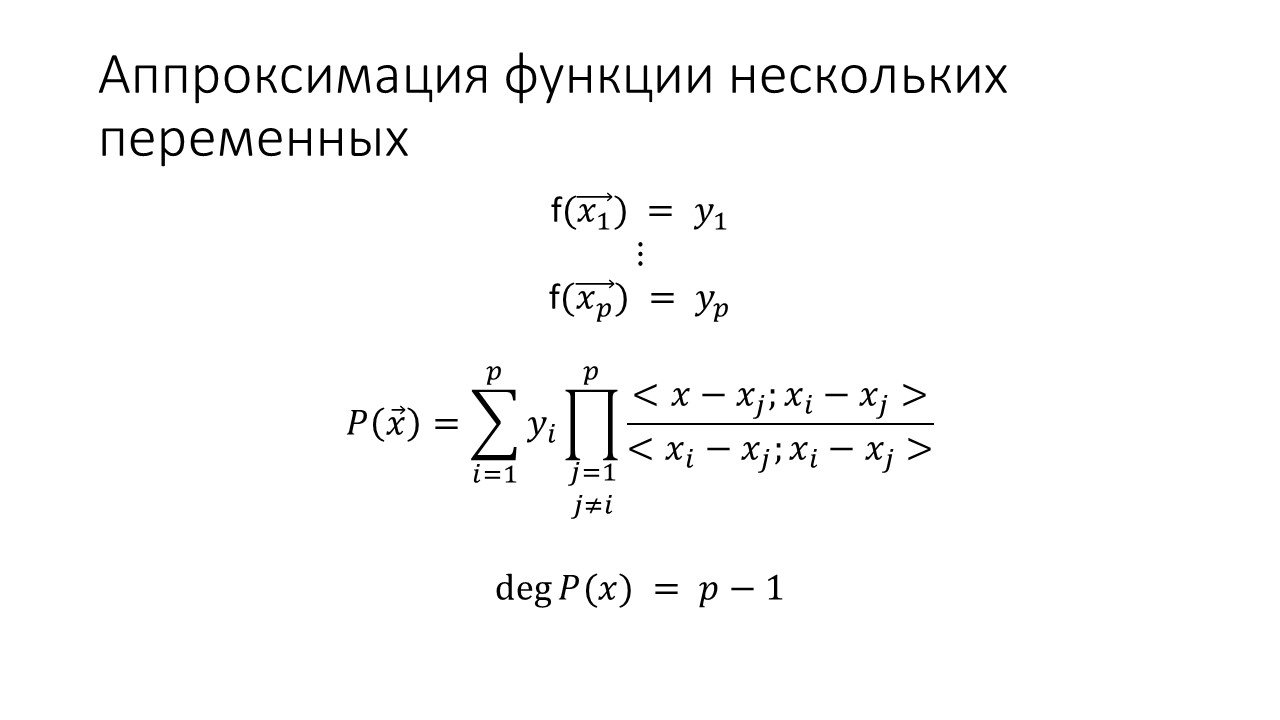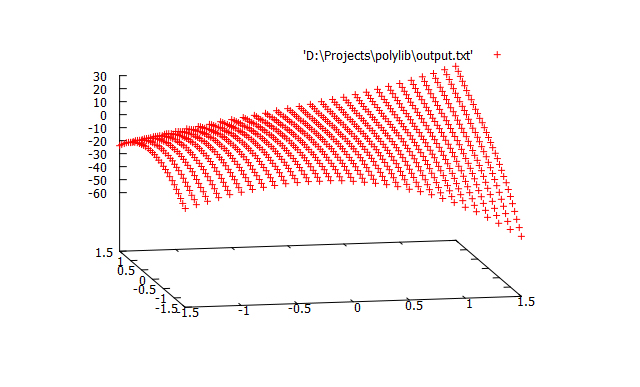
このタイプの近似は、科学計算で広く使用されています。
例:各引数値に対して関数を計算するのは非常にコストがかかります(そして、たとえばNが多くあります)。したがって、値のテーブルが作成され、必要に応じて、関数の値が特定のポイントで取得され、プレートから補間されます。 もちろん、テーブルの初期構築と補間手順(N回)は、関数自体の正確な計算をN回行うよりも「安く」する必要があります。
この式をいくつかの変数の関数の場合に一般化します

ベクトルのスカラー積は、引数Dxの値の分散の平方を考慮して計算されます
- 引数の各座標の等価性を考慮するために、Dx [k] = M2 [k]-M1 [k] ∗ M1 [k]を計算します
- <A; B> = SUM A [k] * B [k] / Dx [k]
アルゴリズム
1.与えられたベクトルXiについて、引数値の分散の二乗のベクトルDxを計算します
2.ベクトルXの場合、最も近いポイントX1、...、Xpのpを見つけます。ここで、ポイント間の距離は、引数値の分散の2乗を考慮して計算されます
3.多項式P(X)= SUM Yi *<X-Xj、Xi-Xj> / <Xi-Xj、Xi-Xj>の値を計算します。ここで、スカラー積は、引数の値の分散の2乗を考慮して計算されます
2つの変数の関数の近似デモンストレーション
history.txt
- -1 -1 -10
- 1 1 10
- 0 0 0
- -1 1 -8
- 1 -1 -20
gnuplotプログラムでステップ0.1でラティスに多項式値をプロットします
- predict.exe -history history.txt -input input.txt -output output.txt -p 5
- splot "output.txt"

// predict.cpp: . // #include "stdafx.h" struct t_previous_result { std::vector<double> x; double y; }; ///////////////////////////////////////////////////////// // double delta(std::vector<double>& a, std::vector<double>& b, std::vector<double>& dx) { auto s = 0.0; auto i = 0; for (; i < a.size() && i < b.size() && i < dx.size(); i++) if (dx[i] > 0.0) s += (a[i] - b[i]) * (a[i] - b[i]) / dx[i]; for (; i < a.size() && i < dx.size(); i++) if (dx[i] > 0.0) s += a[i] * a[i] / dx[i]; for (; i < b.size() && i < dx.size(); i++) if (dx[i] > 0.0) s += b[i] * b[i] / dx[i]; return s; } ///////////////////////////////////////////////////////// // double scalar(std::vector<double>& a, std::vector<double>& b, std::vector<double>& dx) { auto s = 0.0; auto i = 0; for (; i < a.size() && i < b.size() && i < dx.size(); i++) if (dx[i] > 0.0) s += (a[i] * b[i]) / dx[i]; return s; } ///////////////////////////////////////////////////////// // double predict(std::vector<double>& x, std::vector<t_previous_result>& previous_results, std::vector<double>& dx, int p) { std::vector<std::pair<t_previous_result, double>> neighbors; for (auto it = previous_results.begin(); it != previous_results.end(); ++it) { std::vector<double>& x2 = it->x; auto d = delta(x, x2, dx); std::pair<t_previous_result, double> pair(*it, d); neighbors.push_back(pair); } std::sort(neighbors.begin(), neighbors.end(), [](std::pair<t_previous_result, double> const& a, std::pair<t_previous_result, double> const& b) { return (a.second < b.second); }); neighbors.resize(std::min(p, static_cast<int>(neighbors.size()))); auto y = 0.0; for (auto iti = neighbors.begin(); iti != neighbors.end(); ++iti) { auto s = iti->first.y; std::vector<double>& xi = iti->first.x; for (auto itj = neighbors.begin(); itj != neighbors.end(); ++itj) { if (iti == itj) continue; std::vector<double>& xj = itj->first.x; std::vector<double> xxj; std::vector<double> xixj; for (auto i = 0; i < x.size() && i < xj.size(); i++) xxj.push_back(x[i] - xj[i]); for (auto i = 0; i < xi.size() && i < xj.size(); i++) xixj.push_back(xi[i] - xj[i]); s *= scalar(xxj, xixj, dx) / scalar(xixj, xixj, dx); } y += s; } return y; } ///////////////////////////////////////////////////////// // static const int _p = 3; int main(int argc, char* argv[]) { std::vector<t_previous_result> previous_results; std::vector<double> dx; char* input_file_name = nullptr; char* output_file_name = nullptr; char* previous_results_file_name = nullptr; auto p = _p; std::string line; // Windows // setlocale() , - , LC_TYPE - , — . // "Russian", , . setlocale(LC_ALL, ""); for (auto i = 1; i < argc; i++) { if (strcmp(argv[i], "-help") == 0) { std::cout << "Usage :\t" << argv[0] << " [-input <inputfile>] [-output <outputfile>] [...]" << std::endl; } else if (strcmp(argv[i], "-input") == 0) input_file_name = argv[++i]; else if (strcmp(argv[i], "-output") == 0) output_file_name = argv[++i]; else if (strcmp(argv[i], "-history") == 0) previous_results_file_name = argv[++i]; else if (strcmp(argv[i], "-p") == 0) p = atoi(argv[++i]); } if (input_file_name != nullptr) freopen(input_file_name, "r", stdin); if (output_file_name != nullptr) freopen(output_file_name, "w", stdout); if (previous_results_file_name != nullptr) { std::vector<double> m1; std::vector<double> m2; std::ifstream history(previous_results_file_name); if (!history.is_open()) throw "Error opening file"; while (std::getline(history, line)) { std::stringstream ss(line); std::vector<double> x; std::copy(std::istream_iterator<double>(ss), std::istream_iterator<double>(), std::back_inserter(x)); auto y = x.back(); x.pop_back(); t_previous_result previous_result; previous_result.x = x; previous_result.y = y; previous_results.push_back(previous_result); for (auto i = 0; i < x.size(); i++) { if (i >= m1.size()) m1.push_back(0.0); if (i >= m2.size()) m2.push_back(0.0); m1[i] += x[i]; m2[i] += x[i] * x[i]; } } for (auto it = m1.begin(); it != m1.end(); ++it) *it /= previous_results.size(); for (auto it = m2.begin(); it != m2.end(); ++it) *it /= previous_results.size(); for (auto i = 0; i < m1.size() && i < m2.size(); i++) dx.push_back(m2[i] - m1[i] * m1[i]); } while (std::getline(std::cin, line)) { double y; std::vector<double> x; std::stringstream ss(line); std::copy(std::istream_iterator<double>(ss), std::istream_iterator<double>(), std::back_inserter(x)); y = predict(x, previous_results, dx, p); for (auto it = x.begin(); it != x.end(); ++it) std::cout << *it << ' '; std::cout << y << std::endl; } return 0; }
プロジェクトのインターネットアドレス: https : //github.com/dprotopopov/polylib
使用したソフトウェア
- Microsoft Visual Studio 2013-プログラミング環境
- gnuplot-クロスプラットフォームのチャート作成ツールwww.gnuplot.info